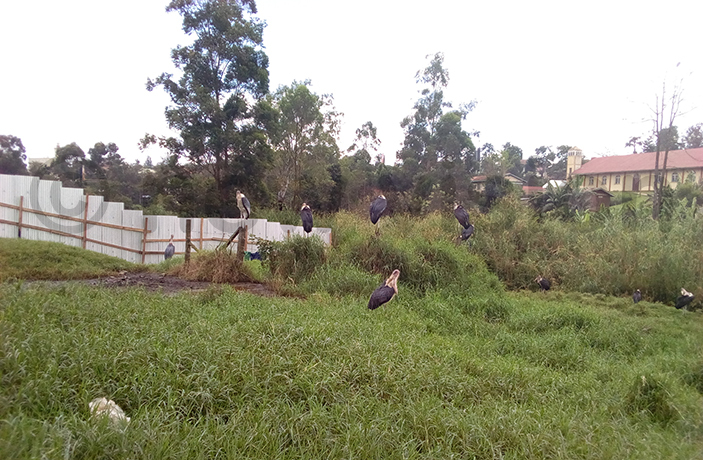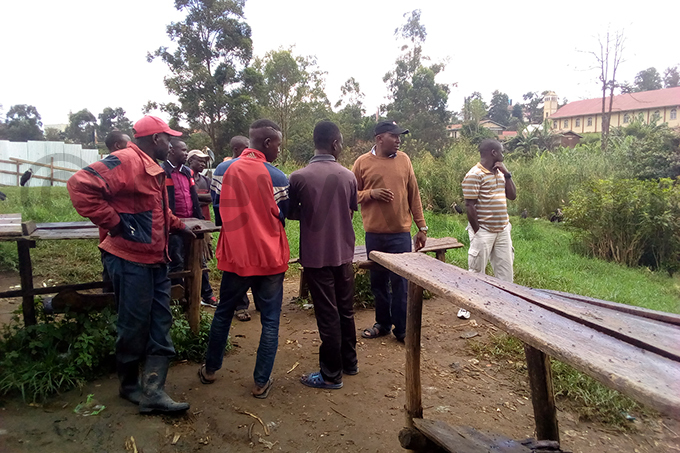Kabarole RDC halts River Mpanga construction works
The criminal investigations department at Fort Portal Central Police Station has been directed to investigate.
The Kabarole resident district commissioner (RDC) Stephen Asiimwe has halted the activities of an investor who had encroached on the banks of River Mpanga.
Asiimwe on Monday directed engineers who had been contracted by Faisal Saleh to seal off parts of the river banks in preparation for a construction site.
The piece of land in question is located in Kabundire West division in Fort Portal Municipality which was being used as the main abattoir.
"We cannot sit down in our offices and watch people destroy the river. I have instructed them to pull down the fence or else we arrest them," Asiimwe said.
He blamed the leaders of Fort Portal Municipal Council for looking on as people destroy the river which is the source of water for the people in the district.
"Government has injected over sh5b for conserving Mpanga River in the next five years and now the leaders are just watching on as the river is being destroyed," he added.
 Part of the River bank which has been sealed off. Photo by Wilson Asiimwe
Part of the River bank which has been sealed off. Photo by Wilson Asiimwe
Asiimwe said that he had directed the office of the criminal investigations department at Fort Portal Central Police Station to investigate circumstances under which the investor got clearance from the Municipal Council leaders to seal off part of the river bank.
"We need to know how they come to start sealing off the river because that is no man's land. People are destroying the river as well as encroaching on the wetlands," Asiimwe added.
Human activities along the banks of River Mpanga are threatening its flow. It flows from the Rwenzori Mountains and crosses the districts of Kabarole, Kyenjojo, Kamwenge before draining into Lake George.
The national environment (wetlands, lake shores and river banks management) regulations of 2000 states that any activity carried out near a river should be one hundred meters away from the river bank.
At Kazingo in Kichwamba sub county, the communities have cultivated food crops on the river banks causing silting of the river.
In Fort Portal town, washing bays have been established 20 meters from the river banks and residual oils from the vehicles seep into the river water.
 RDC Stephen Asiimwe (2nd right) with the locals at the site. Photo by Wilson Asiimwe
RDC Stephen Asiimwe (2nd right) with the locals at the site. Photo by Wilson Asiimwe
Richard Rwabuhinga the chairman of the Mpanga catchment committee said that as leaders, they are concerned by activities being carried out on the river banks.
"What the RDC has done is very right because as a committee, we did not endorse any activity to be carried out on the river bank," Rwabuhinga said.
The Team Leader of the Albert Water Management Zone, Jackson Kitamirike, said recently that they have been carrying out continuous sensitisation and training of stakeholder groups and beneficiary community members in soil and water conservation measures in the upper catchment of the river in Karaungura sub county, Kabarole district.
The River Mpanga management plan provides for the establishment of local environment committees, planting trees near the river banks and the enforcement of environmental by-laws.
"Local environment committees have been established and hundreds of trees planted on the river banks to control silting. However, with the visible results, a lot needs to done for a healthier ecosystem. This calls for more funding into the sector to enable the implementation of the developed catchment management plans," Kitamirike said.
Brian Guma the project manager said they were still some human activities such as cultivation along the river banks and establishment of washing bays that are still leading to silting and discharge of oils into the river respectively despite achieving milestones on silt reduction in the river system.
"We are still engaging the people in the mountainous areas on good methods of farming and controlling human activities along the river banks through the soil and water conservation techniques.
This is aimed at curbing siltation of the river system that in turn increases the farm soil moisture content that has since translated into better crop yields at the demo plots and improve household income with the participating farmers," Guma said.
Guma said that the plan involves setting up income generating projects like tree planting and sensitisation of farmers, which will discourage them from engaging in projects that will destroy the river.
He also says that fibrous root trees will be planted to protect the river banks and sub county leaders will be sensitised about the need to protect the natural resources.